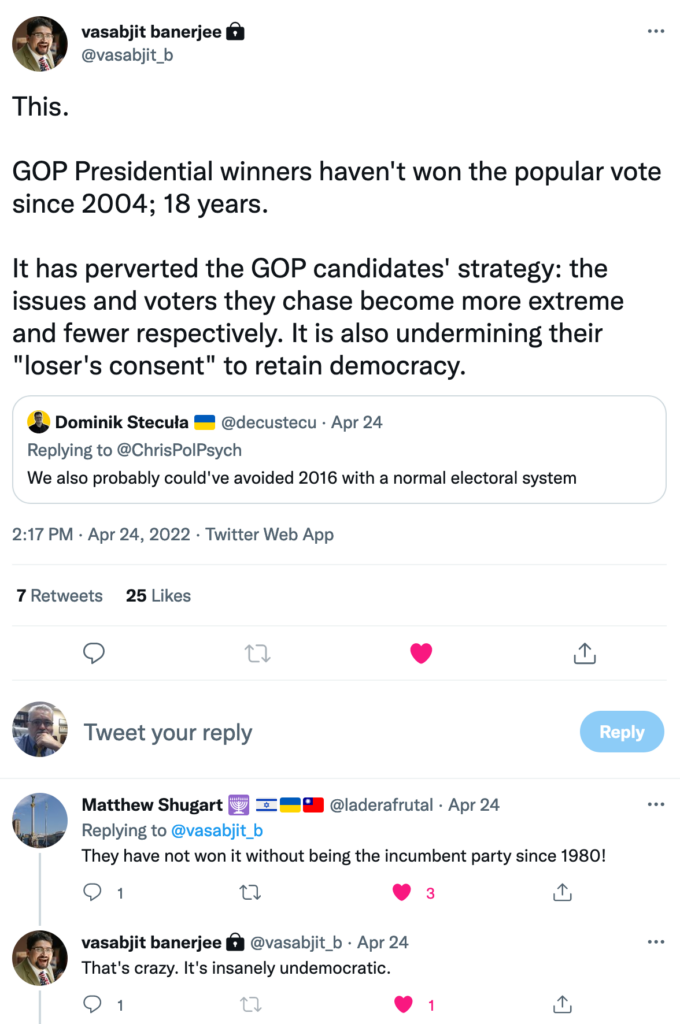An Observation about the 1980 Election
Added historical context to ongoing conversations about American democracy.

Over the weekend I observed, yet again, that since 2000 there has been only one Republican president to win the popular vote (Bush in 2004), yet there have been three Republican presidential terms over that timeframe. Further, the previous popular vote winner was George H. W. Bush in 1988. That’s two popular vote wins since 1988, but four Republican terms and five Democratic ones.
A similar observation was made by political scientist Vasabjit Banerjee with an especially noteworthy elaboration by my friend and co-author, Matthew Shugart:

It really is crazy. The last time a Republican candidate for president won the popular vote in the context in which they were not the incumbent party in the White House was over forty years ago. Reagan won 50.75% of the vote in 1980, and then every subsequent popular vote victory (1984, 1988, and 2004) was in the context of being the incumbent party and two of those were also re-elections of an incumbent president, all of which is an electoral advantage.
In contrast, the Democrats have not only won the popular vote seven times since 1980 (the Republicans have only won it four times since then, three of those being 1980, 1984, and 1988), but they have won the presidency three times without being the incumbent party (1992, 2008, and, 2020). Again: the last time the GOP managed that feat was 1980.
To Banerjee’s point in the top tweet: this means, as I have often noted myself, the GOP simply does not have to adjust its behavior to adapt to losses the way the Democrats have had to do. Setting aside which party one prefers and just consider the implication of a supposedly competitive system that does not force both sides to equally have to adapt to loss. As I know I have said many times: we expect far better of professional sports. Losing is supposed to spur change and innovation so that one can hopefully stop losing. But if one can win without having to, well, actually win, then there is no need to innovate and change.
As I have noted before, losing is an inherent part of democracy, including how a party responds to losing. It stands to reason, therefore, that a party that wins when it shouldn’t damages that party and the system as a whole simply because it damages the basic feedback loop to the population.
All of these facts are largely at the tips of all of our brains, but I don’t think we always give them enough thought. I have noted more than once that 2004 was an incumbency election in the past, but since I kept counting from the last previous popular vote win by the GOP (1988), so I didn’t think back to 1980 and what it represents, historically.






As long as we’re on the subject of the 1980 election, it’s worth remembering that Reagan carried 44 of the 50 states. And that sort of outcome wasn’t exactly uncommon in 20th-century elections.
Nowadays, that type of landslide never happens. When looking toward 2024, for the vast majority of states we can predict with near certainty which party will win each state, regardless of who the candidates will be. And we already have a general idea which states will be the battlegrounds that will decide the election. There could be surprises here and there, but the overall picture is extremely predictable. The Republican is not going to win New York and the Democrat is not going to win Oklahoma.
The concept of battleground states existed 50 years ago, but it was much more fluid from one election to the next than is the case today. There was a sense that virtually all the states were at least potentially up for grabs, even if they tended to lean toward one party or the other. Even in close elections, margins of victory were typically a lot smaller than today. For example, in 1976 Carter won the popular vote by about the same margin as Hillary in 2016–2.1 points. Yet there were 31 states decided by single digits, and 20 decided by under a 5-point margin. In contrast, in 2016, only 17 states were in single digits and just 11 less than 5 points.
When the map is effectively so much smaller, that further distorts the incentives. It’s not just that Republicans don’t need to win the popular vote in order to win an election; they can also comfortably take for granted large swaths of the country in a way that wasn’t feasible in the past. For the half-dozen or so states Republicans currently have their eye on, part of their goal is to install cronies who can overturn the results in case the Dems carry those states again. The nightmare scenario we seem to be hurtling toward wouldn’t be possible (or at least would be a lot harder) if the range of states deciding each election weren’t so narrow and predictable.
The obvious reason the GOP wins is through the electoral college which skews the vote to favor smaller states. Because small states get 2 automatic electoral votes via Senate seats, this means that effectively the bottom 30 states which have an aggregate population the size of California (40 million) has 60 built in electoral votes to California’s 54. Add another 32 EVs based on population representation for those states and you can see these state’s combined 92 electoral votes dwarf California’s 54 for roughly the same population of 40 million.
Couple that with the fact that Dems get 24% of the rural vote and we can see the problem.
What’s really happening? 70% of our GDP is produced from 400 counties out of 3,400. Those 400 counties are BLUE and voted Biden
This vast difference in productivity, innovation, technology, ambition, drive is quite threatening to the inbred cousin fuckers that live in shit kicker land.
Their way of acting out is to “own” the Libs by flying Confederate flags, picking on the “queers”, outlawing abortion, declaring war on blacks and shouting let’s go Brandon as they live in a brainwashed bubble where Donald Trump is a brilliant businessman who never lies.
If the Dems run a 98 year old man in 2024 or a VP who has all but disappeared, the party has a lot more problems than incumbency issues.
I think it’s the Democrats who don’t know how to be winners. When the steel industry stabbed John Kennedy in the back, he went after them hard and channelled Roosevelt. Obama won 2 elections and he wilted every time. Imagine FDR or LBJ apologizing for Shirley Sherrod or the IRS ‘scandal’ or tolerating the obvious grift of climate-change denialism. Just combing through the expense accounts of the people heading the orgs laundering all of this energy money would have been enough to put people in prison as examples. Trump and the current GOP’s corruption is not an aberration. Obama had the political power to do serious damage against the GOP, and the downside was what? He might have made them more angry and racist?
Instead, he went for the middle, did not prosecute war crimes, and did very little to fight against the mindless privatization of this country. And who came after him? To be an actual winner, you can’t be stuck listening to the dumbest/most corrupt people in the world who whine about being divisive as they suck up to the Trumps.
Could this also be reinforcing the Republican belief that all Democratic victories are illegitimate. If you don’t understand the underlying structural issues, it wouldn’t be hard to convince you that it’s cheating.
@Modulo Myself:
I have to admit, things like this often sound like fantasies to me, but I’ll bite: how do you figure?
I would note that Obama was able to get the most significant social policy reform since the 1960s passed–which was how he spent his one real window of real power (60 votes in the Senate). I am not saying he was perfect, but I am always curious as to what people think a president can do along the line you are suggesting (because it often sounds to me like just so much Green Lanterism).
@Steven L. Taylor:
He was a president who came in after the subprime bubble and the Iraq War. Instead of using this opportunity to wage class war, like an actual winner, he chose to squander this by trying to appease the people who made off with the profits in both. There should have been endless hearings in 2009–all of the fraud in Iraq, all of the investment bankers laughing in emails as they walked off with bonuses after selling what they knew was crap. It’s not that difficult. The Iraq War and investment banks were too very unpopular things in 2009. Downstream was the GOP, and they would have taken severe hit. Instead…he ends up getting stymied by the dumbest CNBC commentators named ‘Rick’ or whatever talking about the ‘average guy’. The fact that the fruits of victory after Iraq and the subprime crisis were not seen by Obama as taking on the banks and destroying the regime that got us into Iraq is telling. He didn’t even try, because it was not a realistic goal. I would say that’s the idiotic legacy of Reagan.
AMAZING. Faced with the conditions described above and OTB commenters want to put it on the Democrats/Obama doing it all wrong? Murc’s Law (the widespread assumption that only Democrats have any agency or causal influence over American politics) is the first place to go for answers?
Steven, the “we” in that sentence is what is most interesting to me. The Twitter-ers you cite get the absurdity of these facts. You get the perversity of these facts. Those of us who read your writing here have those facts (though insufficient thinking on those facts is in evidence today), but what more can be done to get these facts into more brains and how can we spur more constructive thinking about how to initiate change?
We’re not being served by the mainstream press, that much is clear. There are well-financed media organizations fully committed to obscuring the situation as well. How do we get a bigger megaphone into the hands of people making the case for electoral reform?
@Modulo Myself:
I think it actually is difficult, actually.
First, consider when has it ever worked that congressional hearings made the political impact you are suggesting? (Not that I disagree that there should have been more action in these areas as a general matter).
Second, you are forgetting that we were still in the Great Recession in 2009 and, as president, Obama was taking quite a bit of the blame. The Tea Party movement emerged for the 2010 elections as a result. Indeed, the counter-Obama movement was powerful enough that the special election to replace Ted Kennedy was won by a Republican in 2010.
Does that really sound like the political environment you seem to be remembering?
Third, again, Obama got the ACA passed–would you have preferred he spent that political capital on Iraq War hearings? If you do, that’s a legitimate choice, but consider what you are arguing.
@Scott F.:
I can’t argue with that.
@Steven L. Taylor:
I’m fairly certain I recall that there was a recession in 2009, but anyone who blamed Obama for that was blowing smoke. The government had to bail out the entire banking system in 2008. Which is kind of my point. Obama let it become the same politics as usual in about a heartbeat. It’s no different than how we were supposed to rationalize the lack of WMDs in Iraq. It took approximately 5 seconds for that to be a non-issue. He had one of the few opportunities since Watergate to put a halt to how power works in America. Was it easy? Probably not. But in the end, there was zero downside if you think the downside of going after the banks and the Iraq War was Republican resistance.
@Modulo Myself:
When in your experience has “blowing smoke” not been an effective political approach? “Blowing smoke” works – that’s why we see it ALL THE TIME.
Obama had finite political capital. He spent it on the ACA. The downside of his administration spending that capital on holding the banking system to account would have been no ACA. I’m also appalled that corrupt bankers got off scot-free, but I’m grateful we got the ACA. That may not have been your choice, but at least recognize that governance means you seldom get all the things you want.
@Modulo Myself:
And yet, it was a rather effective strategy in the 2010 mid-terms. Anyone blaming Joe Biden for global oil prices and global inflation is, likewise, “blowing smoke” and yet I think you will find it will be an effective strategy this November. You are not being realistic about how politics works. If you are president you get more of the blame (and the credit) than you deserve.
@Steven L. Taylor:
I’m being very realistic about how politics could work. If you can blow smoke and have Tea Party minions chant about death panels and keeping socialism out of Medicare, surely this could work against banks.
Look, I get the weakness of my argument. The GOP can call teachers pedophiles, and it’s fine. A few activists say Defund The Police and moderates scream about that in their sleep for 10 years. Regardless of the merits, they both can be classified as blowing smoke. And yet it is bad politics for a few on the left to blow smoke, whereas it’s a yawn when an entire party of reactionaries with actual power does it. The question is whether this is fixable in American politics. But I think that actual winning would require an attempt to fix this.
What has happened is that the Republicans have figured out they can lose California and New York by 10 million votes. As long as they get 51% of the rest of the country, they can win the electoral college. It’s a very clear strategy they are executing.
As noted above, it used to be common for even small popular vote victories to translate into large EC victories. That leant the President *more* credibility by creating the impression of a national consensus. But with the Great Sort and the GOP’s strategy, that’s out the window. Every EC battle is razor thin. So the EC is no longer an indication of consensus; it’s an indication that one party managed to game the system better than the other.